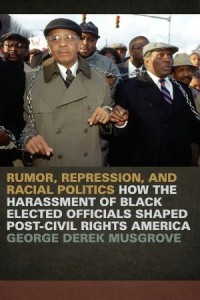Wednesday, May 16, – 7pm – Non-Fiction
George Derek Musgrove
author of Rumor, Repression, and Racial Politics:
How the Harassment of Black Elected Officials Shaped Post–Civil Rights America ($24.95 University of Georgia Press)
 “A real gem. Rumor, Repression, and Racial Politics provides fresh insight into African American political thought and behavior, illuminates the role of rumor and conspiracy theory in post-1960s racial politics, and makes clear African Americans’ changing relationship with the state. Written in accessible prose, it is perfect for use in the classroom, and should also find an audience among general readers with an interest in black politics.”
“A real gem. Rumor, Repression, and Racial Politics provides fresh insight into African American political thought and behavior, illuminates the role of rumor and conspiracy theory in post-1960s racial politics, and makes clear African Americans’ changing relationship with the state. Written in accessible prose, it is perfect for use in the classroom, and should also find an audience among general readers with an interest in black politics.”
—Hasan Kwame Jeffries, author of Bloody Lowndes: Civil Rights and Black Power in Alabama’s Black Belt
“Derek Musgrove has written a provocative study challenging the notion that passage of the 1965 Voting Rights Act ushered in a post-racial, political era that ultimately led to the election of President Barack Obama. His book effectively examines how African American elected officials developed a ‘harassment ideology’ to explain the partisan, governmental prosecutions that disproportionately targeted them with criminal behavior in the 1970s and 1980s. Rumor, Repression, and Racial Politics is a fine example of a new breed of historical writing that connects politics and culture to explain the persistence of racism.”
—Steven F. Lawson, author of Running for Freedom: Civil Rights and Black Politics in America Since 1941
Historians have exhaustively documented how African Americans gained access to electoral politics in the mid-1960s, but few have scrutinized what happened next, and the small body of work that does consider the aftermath of the civil rights movement is almost entirely limited to the Black Power era. In Rumor, Repression, and Racial Politics, George Derek Musgrove pushes much further, examining black elected officials’ allegations of state and news media repression—what they called “harassment”—to gain new insight into the role of race in U.S. politics between 1965 and 1995.
Drawing from untapped sources, including interviews he conducted with twenty-five sitting and former black members of Congress, Musgrove tells new stories and reinterprets familiar events. His cast of characters includes Julian Bond, Adam Clayton Powell Jr., Alcee Hastings, Ronald Dellums, Richard Arrington, and Marion Barry, as well as white political figures like Newt Gingrich and Jefferson Sessions. Throughout, Musgrove connects patterns of surveillance, counterintelligence, and disproportionate investigation of black elected officials to the broader political culture. In so doing, he reveals new aspects of the surveillance state of the late 1960s, the rise of adversary journalism and good government reforms in the wake of Watergate, the official corruption crackdown of the 1980s, and the allure of conspiracy theory to African Americans seeking to understand the harassment of their elected leadership.
Moving past the old debate about whether there was a conscious conspiracy against black officials, Musgrove explores how the perception of harassment shaped black political thought in the post–civil rights era. The result is a field-defining work by a major new intellectual voice.
